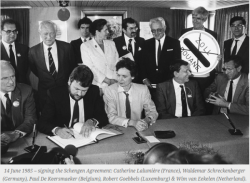$530 Billion Over Ten Years - How The End Of Border-less Travel Threatens Europe's Economy

As a result of incorporating the Schengen Agreement (initially signed in 1985 between just five countries) into the Treaty of Amsterdam (signed in 1997, effective in 1999), Europeans and European businesses enjoy border-less travel in most countries that are part of the European Union.
Or, at least they did.
In an effort to slow Syrian, Afghan, and Iraqi migrants traveling to Europe, many countries are now implementing border controls, a decision that could prove to have significant negative consequences for Europe's economy.


